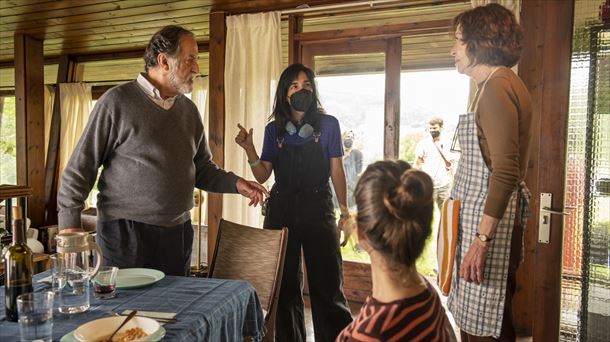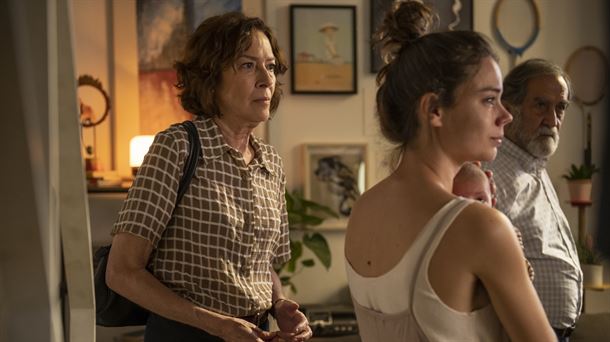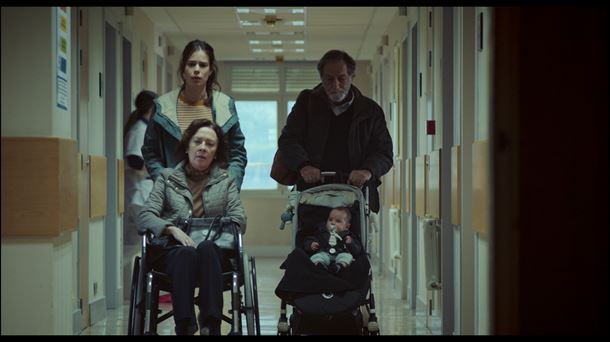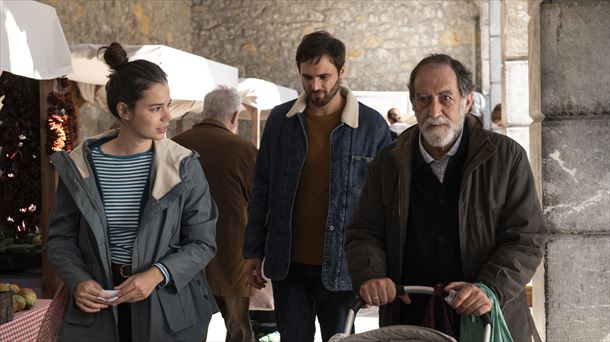Euskaraz irakurri: Alauda Ruiz de Azua: “Naturaltasun, organikotasun eta benetakotasun handiaren bila egiten dut lan”
After a solid career in the making of short films (they say, Chick, does not give me life…) and publicity pieces, the filmmaker Alauda Ruiz de Azua (Barakaldo, 1978) arrives at Hegoalde cinemas this Friday, May 20, with his first feature film, five wolvesin which EITB participates.
The film, which talks about motherhood, communication and family relationships, arrives in theaters supported by its selection for the Panorama section of the Berlinale and its success at the Malaga Festival: best Spanish film, best screenplay, best female performance (ex aequo for Laia Costa and Susi Sánchez) and the audience award.
This audience accompanies Amaia in the film (a brilliant Laia Costa), who has just become a mother for the first time and has to resort to the support of her parents (Ramón Barea, good as always, and formidable Susi Sánchez) in the face of doubts and obstacles. In this journey, far from the epic and very attached to common realities, the generational story fits and reflections are proposed about care, communication and isolation, empathy, precariousness and the collapse of the system, the family…
From honesty, frankness and sensitivity, “Five Little Wolves” talk about everything that does happen to us while we say that nothing happens to us, about what drowns us while we urgently search for one more breath and everything that is wrong hits us relentlessly. Speak without tricks about life, about what we are while doing what we can.
We have chatted with its director before the premiere.
How do you deal with the arrival in theaters of “Cinco lobitos”?
We face the arrival to the rooms with great enthusiasm. It is true that it is not a super good time for movie theaters, but it does seem that we are recovering a certain normality: everything that happened with “Alcarrás” has also been very positive…
We believe that it is a film that can work a lot based on word of mouth, because it touches on very familiar and universal themes. Our hope is that so far people have connected a lot, so we want you to tell and recommend it.
Is a habitat that is often specialized like that of festivals really useful to gauge the response of the public in theaters?
In our case, it has been quite useful because we won the public award in Malaga, and that seemed very indicative to us. In addition, we have participated in colloquiums and screenings, where people come up to you to comment and ask you things, and we have seen that people laughed and were very moved at the screenings.
Therefore, it does serve as a thermometer. You see that you are connecting and touching little hearts, and we have a very good experience.

Filming of ‘Five Little Wolves’
The other day we learned that attendance at the Film Festival has decreased by 60% in this latest edition compared to the previous one. Is it possible to separate creativity from an economic sense of cinema?
Really, I have made the film for the love of art, because I make and make publicity and with that I made a living. The important thing for me was to make it when I wanted to make it and to produce it in the right conditions. I wasn’t doing it with a financial expectation.
Obviously, you do something that is personal and you want it to be seen, or at least to have an opportunity to be seen and talked about. But it is true that the pandemic has been very hard on theaters and it is a difficult time.
In a previous interview, you told me that the film is motivated by the fact that you have not found many stories about what it means to have a baby. Why do you think there is little fiction about something so definitive and that what there is is superficial and, many times, idealized?
Yes, there is more material that remains in a more superficial layer. I think that is already changing because many things have happened generationally, such as the questioning of gender roles or the fact that we are having sons and daughters when we are older. There’s starting to be a lot more storytelling, and we’re opening up to this conversation.
It is true that when I started writing the script I had a hard time finding maternal characters who weren’t crazy women or very heroic women willing to do anything for their son. There was too much epic and there was a lack of an everyday and diverse world, because no father or mother experiences their fatherhood or motherhood in the same way.

Precisely, in “Cinco lobitos” a naturalistic portrait of motherhood is shown, crude and adult, with chiaroscuro, without this necessarily being bad. How did you want to formally put motherhood on the screen?
Yes, there is a commitment to austerity, to try to be honest. I didn’t want to disguise or wrap anything technically.
In addition, there is also a commitment to privacy. It is a film that is made from very inside the houses, very close to home. I wanted to play a slightly invisible camera, where there are no big movements, but nevertheless it is very close. It makes you a very privileged spectator of something very intimate: breastfeeding, arguments with your partner, friction with your mother…
The viewer sees everything very close, but from a respectful place.
The arrival of the girl shakes up a life that was already inhabited by a lack of job security, precariousness, turbulent but forced family relationships, a lack of infrastructure for care… How much of a generational and social portrait vocation is there in the film ?
Yes, it is sought after and the contrast between the two generations is seen.
As far as my generation is concerned, the brush strokes that appear are highly sought after. I am self-employed, I have worked on projects for a long time, and you realize how difficult conciliation is. There are no tools. Beyond aid, there is no organization that favors this.
You survive, you organize as you can. On paper, it seems that you can organize it, but then life takes over.
We women pay a higher toll, especially at work, and there is a will to show that precariousness that is so widespread and that goes beyond social strata.
Communication or, better said, lack of communication is one of the axes of the film. What locks us in silence even when we have little to lose?
It is true. But I think that in all families there is a moment when something very important happens but we don’t talk about it. And the film talks a little about that complexity in family relationships: many times we can love someone very much but we can not understand it.

Laia Costa, Susi Sánchez and Ramón Barea
The work of the leading trio of the film (Laia Costa, Susi Sánchez and Ramón Barea) is exquisite. Why did you choose them and what do you think they have given to your story?
The choice was very intuitive and very fast. I think that all directors keep a file of actors with whom they would like to work; at least i do.
When we started with the script, we had to put a face on them, and it seemed to me that Laia Costa was the perfect age and energy. Not only has she brought truth and naturalness, which is something that we have worked a lot with everyone, but she has a very personal way of interpreting, she makes very nice choices, and that makes you hooked on this film of looks and silences .
I have had an open conversation with her all the time to find what I am looking for, which is for the film to have a lot of naturalness, a lot of organization and a lot of truth.
Susi brought sophistication and complexity to a character who was a housewife in a domestic setting. And it’s something I really like.
Despite being realistic, the film is not fatalistic and opens some cracks to vitalism
Yes, it was necessary to shed some light. When you are a mother or father, this happens a lot in the first years: there are ups and downs, moments of downturn, but suddenly something magical happens and you can’t let it slip away. It is a continuous contradiction.

Laia Costa, Mikel Bustamante and Ramon Barea
How do you think a viewer leaves the film?
People laugh a lot at the screenings. She comes out very excited, and they tell me a lot “I’m going to call my mother” or “I’ve remembered a lot about my parents”.
There is something that I have been told a lot, and that is that, despite its simple appearance, it is a film that grows after being seen, that sparks conversation. That is very beautiful.
The film is full of symbols and winks to the viewer. What audience do you have in mind when writing the script? Who are these winks directed at?
As director, I am the first viewer of the film. That’s why, when I’m writing or shooting, I always try to recover the viewer’s vision. If there is something, for example, that amuses me or annoys me from that point of view, it is when I stop and work on it, I rationalize it.
Source: Eitb
Mario Twitchell is an accomplished author and journalist, known for his insightful and thought-provoking writing on a wide range of topics including general and opinion. He currently works as a writer at 247 news agency, where he has established himself as a respected voice in the industry.












